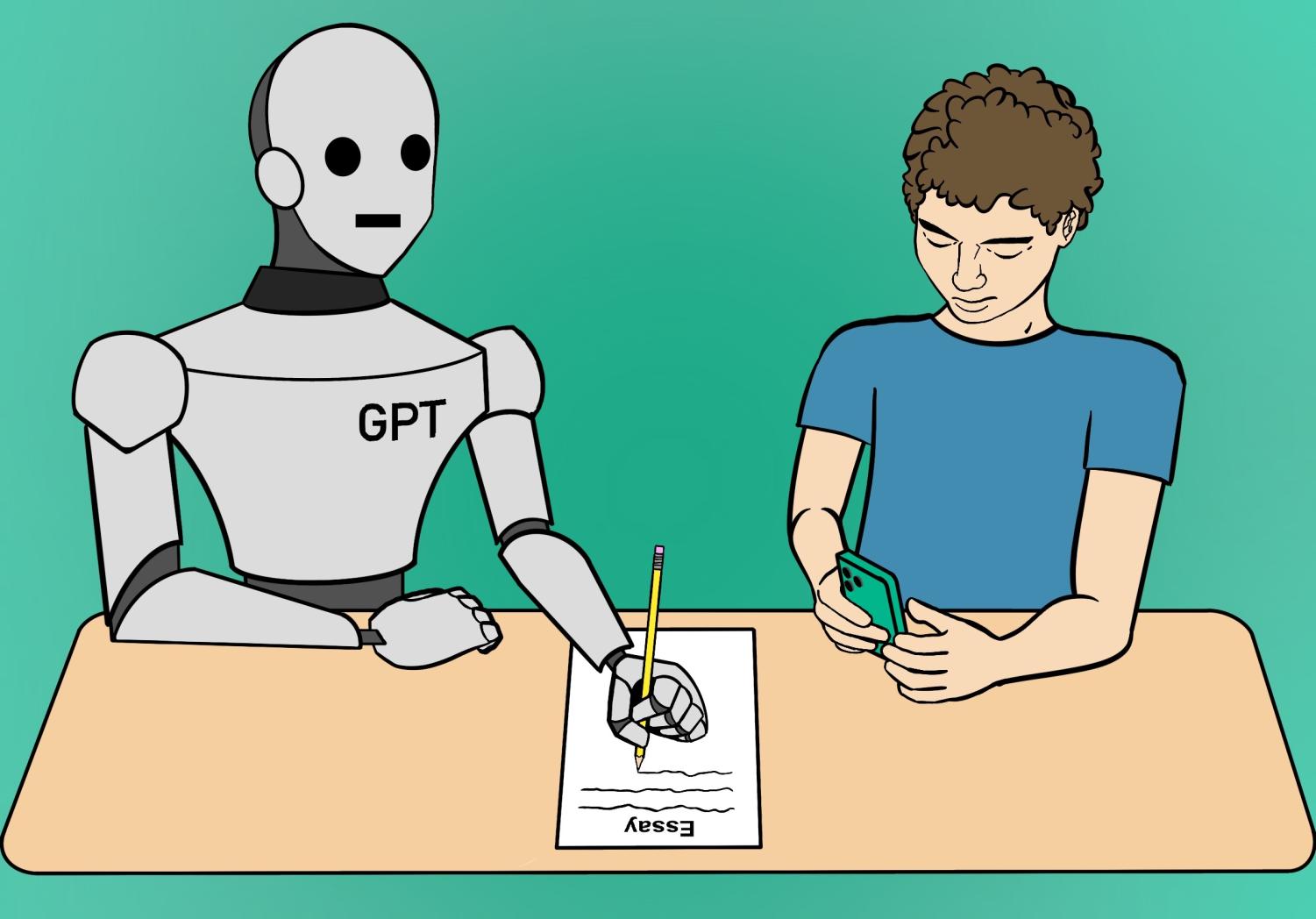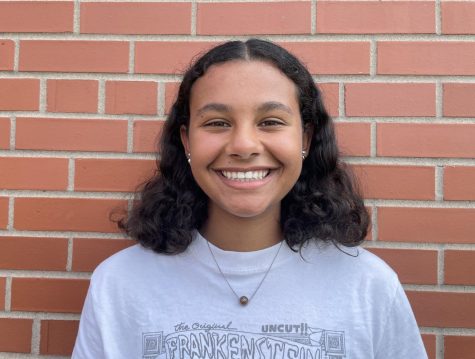GPT vs. GPA
Is software a shortcut to success?
April 13, 2023
A recent surge in the use of artificial intelligence (AI) technologies in schoolwork came with the public release of ChatGPT, OpenAI’s flagship chatbot capable of writing nearly anything a user prompts with the press of a button. Many said they are concerned about the capabilities of artificial intelligence and its potential effects on education with students having unrestricted access to powerful tools capable of completing assignments for them.
Why AI is relevant
Artificial intelligence is a field of technology that simulates human capabilities in machines. Ju Sun, Department of Computer Science and Engineering professor at the University of Minnesota, said one of the most mainstream models of AI at the moment, ChatGPT, aims to simulate human language patterns.
“A very popular, promising field nowadays is ChatGPT,” Sun said. “That’s a field called natural language processing. That emulates the way that people can read and speak — natural languages. We are still far away from matching human-level.”
On OpenAI’s website, anyone can create an account and start asking the powerful AI chatbot any number of questions in a matter of minutes. According to digital learning coordinator Angela Fransen, ChatGPT has been gaining traction among students due to its capabilities and convenience.
“What I know of ChatGPT and why this particular tool has become such a hot topic is because it really does draw from such a broad database, and in a way that really hasn’t been done before — or at least so well-publicized and so well-accessible,” Fransen said. “That has made a big impact that it became an open-source situation that could really be accessible by anyone.”
Some students have started turning to ChatGPT for writing essays and completing schoolwork as a new form of cheating, according to English teacher Kelsey Hanson.
“Students are like, ‘Oh yeah, this is a shortcut for me. I can turn this in and be done with the work,’” Hanson said. “But it is very easy (to detect AI) as a person. ChatGPT does not write like a student and it doesn’t even really write like a human. When kids think they found a shortcut, really what’s going to happen is the teacher is going to follow up and say, ‘I need you to redo this.’”
The multipurpose tool also has many practical applications in school that aren’t dishonest according to senior Denly Lindeman. He said he uses ChatGPT to help him get inspiration for his schoolwork.
“As a tool, I think it’s great,” Lindeman said. “I use it to help come up with ideas for projects. I use it to help me write code. It’s a great tool to help get my creative juices going and help give me an idea of where to do more research.”
According to Fransen, teachers are split on a tool like ChatGPT — despite its positive capabilities, many fear the drawbacks of students using it for dishonest purposes.
“Some folks can get really excited about the possibilities, and then some folks get really fear-based,” Fransen said. “There’s a lot of concern about how it can be used inappropriately or how it can be used — we’ll use the word cheating, but even just to take information and make it a shortcut.”
The impact of AI on Park
According to senior Josh Madigan, students using AI as a shortcut to complete schoolwork could quickly become a big issue at Park.
“A lot of people could use it because they may see it as an easy way to get their essay done, or whatever problem that they’re working on,” Madigan said. “They don’t really have to think through it. They see it as an easier way to get all their work done if they don’t see the work as important.”
Principal LaNisha Paddock said that the administration and the technology department are currently working to mitigate the potential impact of artificial intelligence and ChatGPT on students’ work.
“It has been brought to the attention of our technology department, and they’re definitely looking at how AI influences the work that students are bringing to the table,” Paddock said. “Just as a general practice, most high schools have an academic integrity policy or practice that they abide by, because essentially you’re coming here to get an education, and we want your work.”
Having this type of resource is really nice and it’s something that can really be scaled up. As long as it’s used in a way that is as a stepping stone in support, as opposed to replacement, it can be very effective.
— Angela Fransen
Lindeman said that although he thinks students have good intentions, with the availability of a possible shortcut for doing schoolwork, they may be inclined to take it.
“I don’t think anyone really wants to be academically dishonest, but I mean, no one likes doing homework, myself included,” Lindeman said. “It’s an easy way to try and get out of that. No one’s going to do more work than they have to.”
Madigan said ChatGPT is useful as a learning support tool because it can help simplify difficult concepts in a convenient way.
“Overall, it hasn’t had too large of an impact on my learning,” Madigan said. “Once in a while, if I’m confused about some concepts or something like that, I may turn to AI and ask a simple question, and it’ll usually give me an explanation in a way that I can understand.”
According to Fransen, artificial intelligence can be very useful as a supplement to in-class learning.
“We’re in a teacher shortage and that’s going to be happening everywhere for a while,” Fransen said. “Having this type of resource is really nice and it’s something that can really be scaled up. As long as it’s used in a way that is as a stepping stone in support, as opposed to replacement, it can be very effective.”
The future of AI in school
Artificial intelligence is quickly gaining traction in education. Khan Academy recently unveiled their upcoming GPT-4-powered AI tutor Khanmingo, designed to help students understand complex concepts in a more personalized way. This integration of GPT in education is starting to show the world the unique educational possibilities of AI.
Park has already taken a step toward banning the general use of artificial intelligence in schoolwork by blocking the OpenAI website on the school WiFi, but teachers and students alike are questioning if this is the right route to take.
Lindeman said he hopes for Park to integrate AI into its education in the future, rather than banning the technology as a whole.
“I hope that Park sees the benefits in it, because there are reasonable uses for it and ways that are good to use,” Lindeman said. “I would really hate to see them just do a blanket ban and say there is no acceptable use for this at all, because there are uses where it is a great tool.”
According to Dongyeop Kang, Department of Computer Science & Engineering professor at the University of Minnesota, education has to fundamentally change if teachers want to make sure students aren’t using AI to cheat.
”You may see even a better version of ChatGPT pretty soon in a couple of months,” Kang said. “Then how are we going to stop students from using these tools? Education as a whole will also have to change at the same time as we start to see these new technologies as useful tools rather than, ‘Oh, this is cheating.’ The world is changing. Our education system should also be changing accordingly.”
I would really hate to see them just do a blanket ban and say there is no acceptable use for this at all, because there are uses where it is a great tool.
— Denly Lindeman
Hanson said AI can be very helpful long-term for students and teachers alike, but teachers must take initiative to educate students on the ethical and practical implications of relying too heavily on AI.
“Teachers need to embrace it and learn what it can do for students, but also what it can do for teachers,” Hanson said. “I am in this Facebook group about AI for teachers and people are actually using it in a useful way. It could be incorporated better, so in the long run, teachers need to learn more about it. Students need to learn that it’s not a replacement for doing their work.”
According to Kang, the decision to use AI-generated content in schoolwork will ultimately be an ethical one made by the students. He said that students ultimately should rely less on AI for their schoolwork.
“Maybe AI can do a better job than you,” Kang said. “What’s the purpose of education? You have to learn how to produce your own thoughts and critical thinking skills, and if you don’t learn these skills in high school, you’re going to be useless.”
Park’s assistant principal Alyssa Gardner said Park has no clear plans to incorporate AI into education yet.
“There’s ways to integrate it,” Gardner said. “But again, it’s so new to us, we really haven’t had the time to process that with staff and figure out what it looks like.”

